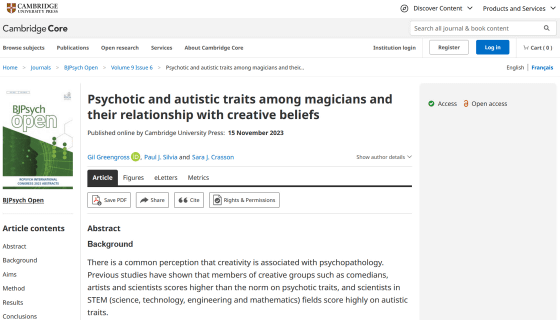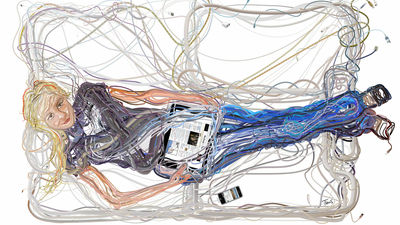Creative people are more likely to suffer from mental illness, but magicians are less likely to suffer from mental illness than the general public.

It is said that people in creative professions such as musicians, writers, painters, and comedians often have mental illnesses such as schizophrenia and bipolar disorder. However, a new study has found that ``magicians'' who perform fascinating magic tricks in public are less likely to suffer from mental illness than other creative professions or the general public.
Psychotic and autistic traits among magicians and their relationship with creative beliefs | BJPsych Open | Cambridge Core

Creative minds are vulnerable to mental illness – but magicians escape the curse
https://theconversation.com/creative-minds-are-vulnerable-to-mental-illness-but-magicians-escape-the-curse-216319
Magicians' Minds Have One Surprising Thing in Common With Scientists', Study Discovers : ScienceAlert
https://www.sciencealert.com/magicians-minds-have-one-surprising-thing-in-common-with-scientists-study-discovers
Previous research has shown that people who work in fields that require creativity are about 8% more likely to develop bipolar disorder than the general population, and writers in particular have a 121% increased risk of developing bipolar disorder. I know . A study that analyzed genetic samples from 86,000 people in Iceland found that creative workers such as visual artists, dancers, musicians, writers, and actors were more likely to inherit schizophrenia and bipolar disorder. It has also been shown that there is a high risk of
Are creative people more susceptible to mental illness than others? -GIGAZINE

Gill Greengross , a lecturer in psychology at Aberystwyth University in the UK, says, ``Even people who have not been clinically diagnosed with schizophrenia, for example those with less severe symptoms of a mental illness, sometimes experience mind wandering. 'They experience disorganized thinking, which can be a hindrance to their ability to concentrate, but may be beneficial in fostering creativity.' In other words, mental illness traits can sometimes increase creativity, and as a result, people with mental health problems may be successful as creators.
In addition to writers and musicians, comedians who make people laugh have also been found to have characteristics associated with schizophrenia and bipolar disorder. On the other hand, there has not been much research into magicians who perform creative shows in public like comedians.
Therefore, Greengross' research team conducted a study to compare the psychotic characteristics of magicians with other creative groups and the general public. Mr. Greengross said that while magicians are similar to comedians in that they create and perform their own shows, unlike comedians who have a chance to recover even if their jokes fail, magicians are able to recover from even one mistake. He points out that there is an unforgivable severity. 'This unique work environment and skill set makes magicians an interesting creative group to study,' Greengross said, because magicians are required to be highly skilled.
The research team surveyed 195 magicians to assess their propensity for traits associated with autism and schizophrenia, and compared the results with samples of the general population and other creative populations. Magicians are mainly active in the United States and the United Kingdom, and the average number of years they have been active as a magician is 35 years, and the breakdown is diverse, including close-up magicians, mentalists, card magic experts, and magicians who perform on large stages. He said.

The analysis showed that magicians scored on par with the average person in autistic tendencies and abnormal experiences such as hallucinations. In addition, it was found that creative people showed lower scores than the general population on items such as schizophrenic indicators (cognitive confusion, introverted anhedonia, and impulsive nonconformity), which are high in creative people. According to the research team, the ``schizophrenic profile'' of magicians is more similar to that of mathematicians and scientists than to other creative groups.
Explaining why magicians' psychopathic traits differ from other creative groups, Greengross said, ``These magicians have very high concentration, low levels of social anxiety, and are prone to abnormal experiences, distorted thinking, and hallucinations.'' All of these characteristics are very advantageous for magicians' work, which requires them to concentrate on their craft without distractions.''
In a magic show, it is important to perform accurate movements in front of people without making mistakes, which requires concentration and repeated training. On the other hand, even if you don't create new tricks from scratch, you can create original shows by making adjustments to existing magic tricks.
'Our study shows that not all creative individuals are created equal and that the link between creativity and psychopathology is more complex than previously thought,' said Greengross. ” he commented.

Related Posts:
in Science, Posted by log1h_ik






